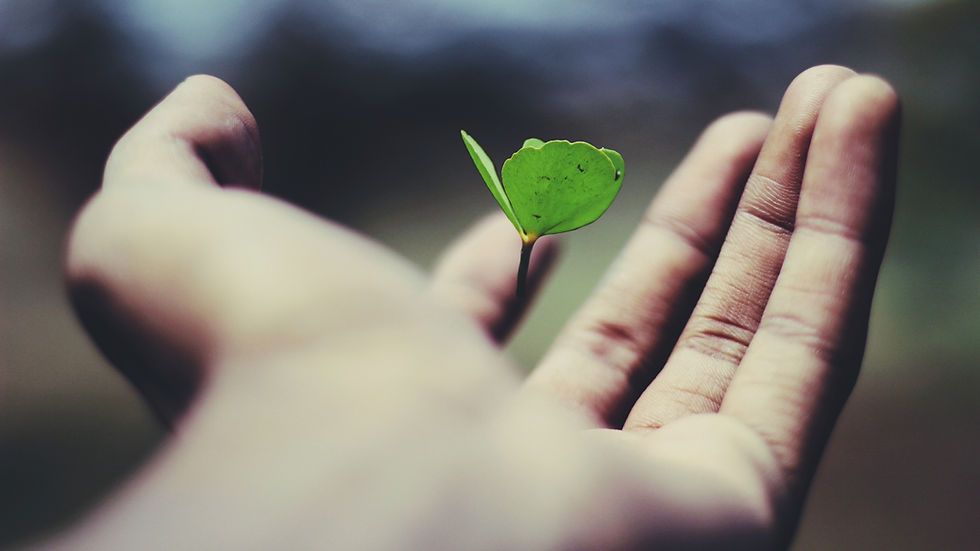The Magic of Mindfulness: An Introduction
- Gemma Louise Bull

- Sep 9, 2024
- 4 min read
By Gemma Louise Bull

I have been thinking a lot about mindfulness recently. Recently, I collapsed at home and I had to be rushed to hospital. Thankfully, the reason for the collapse has been easy to manage but I have been left with a new medical regime which requires more thought.
As someone who runs two businesses – with a range of personal commitments – it has not been possible to stop everything. For most of us, it isn’t an option. But we do need to take time out, especially when we need to heal physically, emotionally or spiritually.
In a challenging world, with both internal and external pressures, it can be extremely difficult to switch off. Over the last few years, we have all witnessed terrible things: a pandemic; a cost-of-living crisis; the Ukraine-Russia War; and the devastating scenes in the Middle East.
As much as we may try to avoid the news - and remain calm - it is almost impossible to avoid it completely. So how can we take time to rest and relax?
What is mindfulness?
According to nhs.uk, mindfulness ‘is about living more in the present moment, appreciating the here and now, and not dwelling too much on the past or future’.
Well, that seems easy, doesn’t it? Umm.. perhaps not.
It is not that easy to appreciate the ‘here and now’ when the ‘here and now’ involves dealing with aggression from drivers, watching someone you love unwell, managing grief or any of the many other challenges – or curveballs as I like to call them – that life can throw at us.
In those moments, we may actually not want to be in the ‘here and now’ but, according to mindfulness specialists, we can still find a sense of calm.
Top Tips
Be aware of your surroundings and the positive things you can see, hear, smell, etc.
Let’s take the car example. You’re stuck in a traffic jam, frustrated about being late, perhaps hungry or thirsty. In such a situation, it is normal to feel tense (especially if you're prone to ‘hangry moments' like me) but, if we look around us, we can usually find something positive. Maybe you can see a bird soaring in the sky, or a family laughing in the car next to you. Perhaps your favourite song is playing on the radio, or the person behind you is car dancing – another thing I am known for. Anything positive that you can focus on makes you more mindful of where you are in that particular moment.
Accept your feelings
We often try to bury our emotions. The classic response to ‘How are you?’ is frequently, ‘Oh, I’m fine and you?’. I know I say I am fine even when I am having a challenging day. In some ways, we need to do that to manage our daily commitments. But, and this is a big but, we do need to be able to feel – and accept – how we feel.
So, if you have an angry thought, or an anxious one, try not to dismiss it every time. Find a few minutes of quiet and let your thoughts float in and out. Make sure you are somewhere where you feel safe and comfortable. Feel what you need to feel. Emotions – especially those that are perceived as ‘negative; – don’t last forever.
If you find it difficult to organise your thoughts, you could write them down and consider how you feel about each one. Most thoughts – and indeed feelings – are fleeting. Something that seems important today may be forgotten in a short time. So, try to identify the things that are most important and – crucially – what you can do about them. For the rest of your thoughts, listen to them, feel them and then let them float away.
Mindful activities
We are often so busy that we try to do multiple things at the same time. Eating whilst checking our emails, watching TV and talking at the same time, being with our friends/family and scrolling on social media. The main problem with such high levels of multi-tasking is that we are often missing so much of our experiences because we are so overloaded.
When I am with my friends – and particularly my family – I put my phone to one side and, if I am out for dinner, it stays in my bag. I want to focus on the people I am with, the lovely food I’m eating and the atmosphere around me.
I definitely don’t have the right balance yet though and it’s something I need to work on more. But, by being aware of my activity overload, I can try and do something about it.
There are many other mindfulness techniques and we will look at more in future articles, in particular how to develop mindfulness in children. Mindfulness can be a powerful tool to help exam anxiety so we will definitely be offering some support and advice closer to the exams.
As always, these tips do not represent medical advice and, if you are going through a period of anxiety or depression, it is highly recommended that you contact your GP or one of the following organisations:
MIND - https://www.mind.org.uk/
Every Mind Matters - https://www.nhs.uk/every-mind-matters/mental-wellbeing-tips/
Anxiety UK - https://www.anxietyuk.org.uk/






Comentários